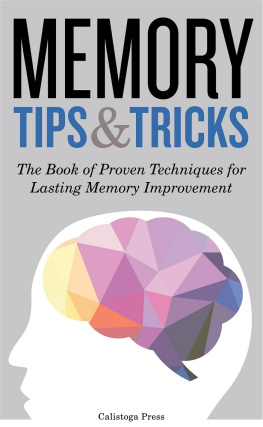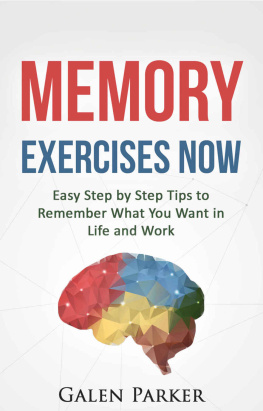Gary Small, M.D.
Contents
Chapter One
You Have More Control
Than You Think
Chapter Two
Rate Your Current Memory
Chapter Three
Look, Snap, Connect:
T HE T HREE B ASIC M EMORY T RAINING S KILLS
Chapter Four
Minimize Stress
Chapter Five
Get Fit with Mental Aerobics
Chapter Six
Build Your Memory Skills
Beyond the Basics
Chapter Seven
Start Your Healthy
Brain Diet Now
Chapter Eight
Choose a Lifestyle That
Protects Your Brain
Chapter Nine
Wise Up About Medicines
Chapter Ten
Dont Forget the First
Nine Chapters
Nearly everyone struggles with some form of memory loss before reaching middle age. Thanks to recently developed brain-imaging and genetic technologies, scientists can now observe the earliest physical indicators of brain aging in people as young as twenty-five. Tiny plaques and tangles that develop and grow ever denser in our brains often begin accumulating decades before any middle-age forgetfulness sets in. A minute spot of plaque on a 30-year-old brain could possibly indicate Alzheimers disease forty years from now, just as a tiny little snag of the dentists probe can mean a cavity in the making.
But we need not despair. Misplacing your keys a couple of times doesnt mean you should start labeling your cabinets. Memory loss is not an inevitable consequence of aging. Our brains can fight back, and The Memory Bible will give you the tools. We can improve our memory performance immediately and stave off, possibly even prevent, future memory decline. The sooner all of us begin our memory program, the sooner we will be on the path to keeping our brains young and healthy for the rest of our lives.
Gary Small, M.D.
Los Angeles, California, May 2002
Chapter One
You Have More Control Than You Think
I have a photographic memory but once in a while I forget to take off the lens cap.
M ILTON B ERLE
Imagine struggling your way out the glass doors of a crowded mall in late December, loaded with shopping bags, packages, and presents. Your head is pounding and your feet hate you and the shoes you walked in on. Youd die of starvation this second if you werent already dying of thirst. You manage to pull out your car keys and glance up at the humongous, jam-packed parking structure when it hits youyouve forgotten where you parked.
Could never happen to you, you say? Ever forgotten your purse, wallet, file, or phone at home, only to remember it while caught in rush hour traffic? Maybe youve struggled to remember the name of a movie you saw last night or that new neighbor you just met, not five minutes ago. Ring a bell?
Most of us laugh off these so-called middle-aged pauses, considering them just another normal annoyance of aging, not a true memory problem, and certainly not a sign of Alzheimers diseasenot at our age. I hate to pop another I could party all night and still get to work on time if I wanted to baby-boomer bubble, but its time for us all to wake upwe are all one day closer to Alzheimers disease.
It Is Never Too Late or Too Early to Fight Brain Aging
Just as all of us inevitably get older, recent convincing scientific evidence shows that Alzheimers disease is not simply an illness that some old people get. Alzheimers disease or a related dementia may well be everybodys end result of brain agingand it begins forming in our brains much earlier than anyone previously imagined, even in our twenties.
The subtle, gradual aging of the brain starts as tiny plaques and tangles that begin accumulating there, decades before a doctor can recognize any symptoms of the disease. In fact, these plaques and tangles begin forming so early in our adult lives that subtle memory and language changes go unnoticed and ignored for many years. Nonetheless, these minuscule spots of plaque in our otherwise healthy brains are the first signs of brain aging, and they will increase insidiously if we do nothing about them.
When I speak on this subject I am often asked: Will my brain already be irreversibly damaged by the time I reach middle age? Is it too late for me to try to head off this inevitable process? Is it too soon for me to start? Is my memory ability destined to decline no matter what I try to do about it?
My answer to these questions is no. It is never too late or too early to start beating the brain-aging game. Even if one day research finds a way to restore already lost brain cells, scientists agree that preventing the loss of memory will always be easier than restoring it. The sooner we rise to the challenge, the sooner we can intervene in the battle, like little neuron-gladiators, and, with luck, do so while our forgetfulness is minimal or even imperceptible.
Our Brains Arent Getting Any Younger, but They Can Get Better
One of the biggest obstacles to starting a program to improve memory performance and protect our brains from Alzheimers disease is denial that ones brain, as well as ones body, is aging. Many people struggle to accept the physical changes that come with passing years, yet coming to terms with mental changes is often an even greater challenge.
Sally B. had a reputation as a fabulous hostessher parties had always been the talk of the town. For several weeks her daughter had been reminding her to prepare a guest list for her sixty-fifth birthday party, but Sally just kept forgetting to do it. Finally her husband Jerry mentioned that she was forgetting quite a few things lately and suggested she discuss this with their family internist.
Sally scoffed at Jerrys accusation and told him that her mind was perfectly fine. If anyone was getting old and losing their marbles, it was he. It was just that the thought of a sixty-fifth birthday didnt seem right for someone like her. She didnt feel 65, and thanks to Dr. Mark, she sure didnt look it. In fact, lots of people at the club said that she and her daughter looked just like sisters.
In the last ten years, Sally had undergone two face-lifts, cheek and chin implants, liposuction, breast lift and augmentation, innumerable Botox and collagen injections, and a tummy tuck. She was a regular at Dr. Marks surgery center and had met almost every anesthesiologist, nurse, and orderly that worked there.
Jerry, still going on about her birthday, insisted Sally allow them to throw her a wonderful party for a changeshe wouldnt have to do a thing! Sally laughed. Of course I will. Ill have to call Dr. Mark and have my eyes done right away.
Jerry hit the roof. No more calling Dr. Mark, Sally. You cant have plastic surgery every six months. Its not good for you.
Sally looked hurt and responded indignantly, I havent had anything done in two years.
Jerry said softly, Honey, what about the tummy tuck five months ago? Dont you remember? You couldnt walk for two weeks.
Sally thought about it. Oh, yeah, right. Well, that had nothing to do with my face. Besides, that Linda Bens Dens something, at the club, gets a face-lift every year for Christmas, and she looks just fine.
Jerry cut a deal with her. If shed accompany him to their family doctor to discuss her memory changes, hed back off about the surgery. Sally agreed.
The internist performed a standard memory test on Sally in the office and was concerned enough to send her to a geriatric psychiatrist to get a more detailed assessment. After several meetings, the psychiatrist sat down with Sally and Jerry together. Sally was indeed suffering from some mild age-related cognitive impairment. As difficult as that was for her to accept, thankfully there were plenty of things she could do to fight it; however, getting another face-lift or eye job surely wasnt going to help.












